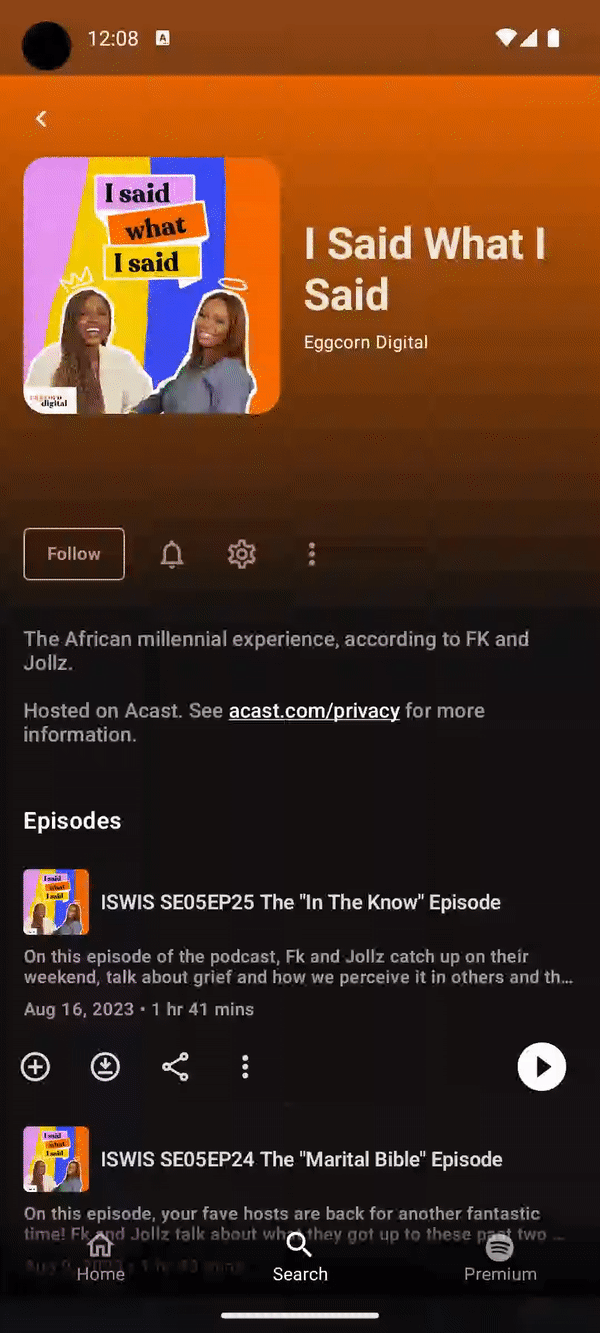Placeholders
The following guide helps create the UI/UX seen below:

The code for the above can be seen in the Musify Spotify clone, on the Podcast episode detail screen.
Guide
When loading data from asynchronous sources, it is sometimes required to show static data first.
Since tiling exposes a List, inserting placeholders typically involves emitting the placeholder
items first.
Consider the following repository that fetches a list of podcast episodes from the network with paginated offsets:
private const val LIMIT = 20
/**
* A query for tracks at a certain offset
*/
data class PodcastEpisodeQuery(
val offset: Int,
val limit: Int = LIMIT,
)
interface PodcastEpisodeRepository {
suspend fun episodesFor(query: PodcastEpisodeQuery): List<Track>
}
The above can be represented in the UI with a sealed class hierarchy for presentation:
sealed class PodcastEpisodeItem {
data class Placeholder(
val key: String,
) : PodcastEpisodeItem()
data class Loaded(
val key: String,
val track: Track,
) : PodcastEpisodeItem()
}
The tiling pipeline can then be used to emit placeholders immediately, then the actual items can then be fetched asynchronously.
fun tiledPodcastEpisodes(
startQuery: PodcastEpisodeQuery,
queries: Flow<PodcastEpisodeQuery>,
repository: PodcastEpisodeRepository,
): Flow<TiledList<PodcastEpisodeQuery, PodcastEpisodeItem>> = queries
.toPivotedTileInputs(
PivotRequest<PodcastEpisodeQuery, PodcastEpisodeItem>(
onCount = 5,
offCount = 4,
comparator = compareBy(TrackQuery::offset),
nextQuery = {
copy(offset = offset + limit)
},
previousQuery = {
if (offset == 0) null
else copy(offset = offset - limit)
},
)
)
.toTiledList(
listTiler(
order = Tile.Order.PivotSorted(
query = startQuery,
comparator = compareBy(TrackQuery::offset)
),
limiter = Tile.Limiter(
maxQueries = 3
),
fetcher = { query ->
flow {
val keys = (query.offset until (query.offset + query.limit))
// emit all placeholders first
emit(keys.map(PodcastEpisodeItem::Placeholder))
// Fetch tracks asynchronously
val episodes = repository.episodesFor(query)
// if the repository returns a `Flow`, `emitAll` can be used instead
emit(
episodes.mapIndexed { index, track ->
PodcastEpisodeItem.Loaded(
// Make sure the loaded items and placeholders share the same keys
key = keys[index],
track = track,
)
}
)
}
// A basic retry strategy if the network fetch fails
.retry(retries = 10) { e ->
e.printStackTrace()
// retry on any IOException but also introduce delay if retrying
val shouldRetry = e is IOException
if (shouldRetry) delay(1000)
shouldRetry
}
// If the network is unavailable, nothing may be emitted
.catch { emit(emptyTiledList<PodcastEpisodeQuery, PodcastEpisodeItem>()) }
}
)
)